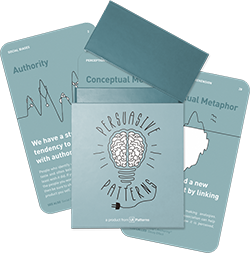Periodic Events
Design Pattern
Alternate titles: Traditions.
Problem summary
Construct recurring events to build up anticipation, a sense of belonging, comfort, and a sustained interest
Usage
- Use to engage users into coming back to your experience time and time again.
This card is part of the Persuasive Patterns printed card deck
The Persuasive Patterns Card Deck is a collection of 60 design patterns driven by psychology, presented in a manner easily referenced and used as a brainstorming tool.
Get your deck!Solution
Consider ways to create shared recurring experiences users can look forward to or reminisce about. Examples are weekly tips, Black Friday sales, and monthly report cards.
- Create a tradition. Recurring traditions and ceremonies creates an experience users can look forward to or reminisce about and can help foster a sense of belonging and comfort. Examples are weekly tips, monthly report cards, throwback Thursdays, and even Black Friday sales.
- Make the experience shared. Consider how all users or groups within a system can enjoy shared recurring experiences to build a sense of belonging. How can you facilitate the users share the experience with each other?
- Build a narrative. Tying a narrative structure around periodic events will provide meaning and and motivating anticipation of future events and help direct users toward appropriate action when the periodic event happens.
Rationale
Anticipation of an upcoming event can in itself be motivating and can provide a limited period of time, where users prepare themselves potential action or commitments. Events temporarily create special places that are different from everyday places, which provides a great occation for taking action, breaking patterns, starting new habits, or changing behaviors or attitudes.
Studies conncerning the field of events is mostly found in the disciplines of sociology and anthropology. However, research on social psychology and the motivatinng power of anticipation of events is gaining momentum.
1 Benckendorff & Pearce (2012). The Psychology of Events. In S. Page & J. Connell (Eds.), Handbook of Events. New York: Routledge.
2 Filep, S., et. al. (2015). On Positive Psychology of Events, Event Management 19(4):pp. 495-507.
3 Periodic Events at Learning Loop
User Interface Design Patterns
- Forms
- Explaining the process
- Community driven
- Tabs
- Jumping in hierarchy
- Menus
- Content
- Gestures
- Tables
- Formatting data
- Images
- Search
- Reputation
- Social interactions
- Shopping
- Increasing frequency
- Guidance
- Registration
Persuasive Design Patterns
- Loss Aversion
- Other cognitive biases
- Scarcity
- Gameplay design
- Fundamentals of rewards
- Gameplay rewards
